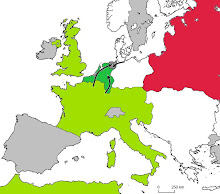With the Germans retreating on all fronts in November Hitler gathered his generals to stop the rot. In an uncharacteristic moment of clarity, the Fuehrer listened intently to their suggestions and, even more amazingly, agreed to a retreat. The Balkans were evacuated, with Athens and Tirana razed to the ground, to the horror of the allies. South western France was abandonned and before the allies realised it, nearly one million garrison troops suddenly became available on the vital frontlines in Russia and France.
The effect was immediate. Five fresh divisions were allocated to Von Rundstedt in the west and very soon a furious battle developed around Paris. On the 17th Eisenhower realised that to avoid encirclement he would have to retreat from the city. De Gaulle was appalled and distraught, but even the French general understood the wisdom in Eisenhower's assessment of the situation. Reluctantly the Free French were evacuated from Paris, and on the 21st the French capital was retaken by the Nazis, while a division of US shermans fought an unequal battle against three German armoured divisions. The US casualties at the battle of Evry were some of the worst in US military history.
On the eastern front fresh troops from Greece, including heavy tank battalions, made their presence felt in Romania, forcing the Red Army back up the valley and retaking Bucharest on the 23rd November. The German army fulfilled their leader's wish to turn the Romanian countryside red with blood, burning Romanian settlements as a punishment for their disloyalty. By the end of November the Germans, against the odds, had stabilised the situation on both the eastern and western fronts, and all hopes of victory by Christmas had evapourated in the allies' leaders' minds.
Sunday, 8 November 2009
Subscribe to:
Post Comments (Atom)

No comments:
Post a Comment